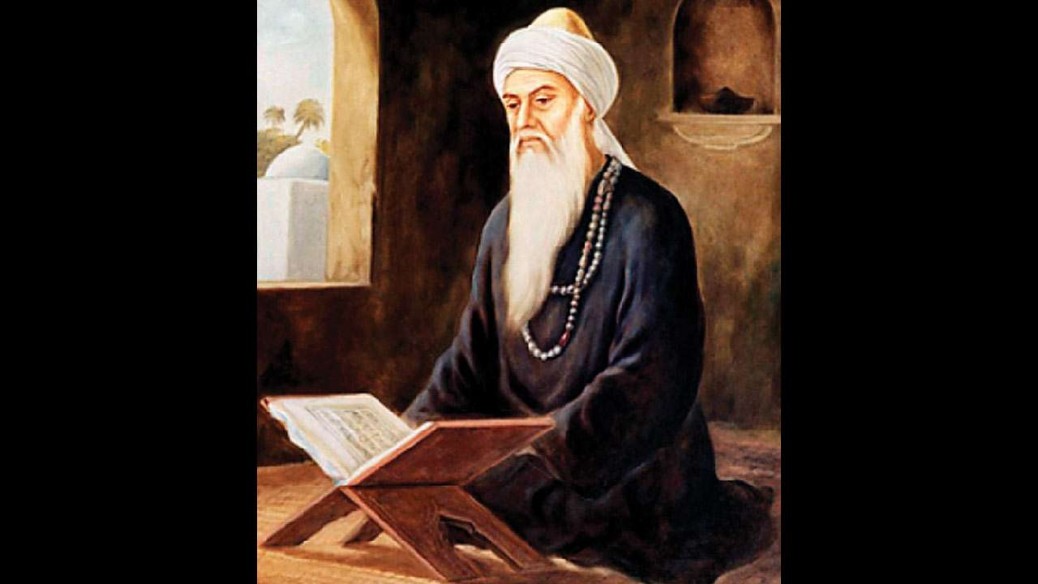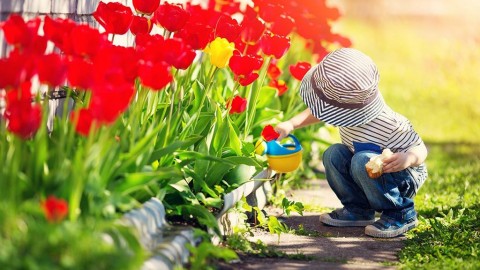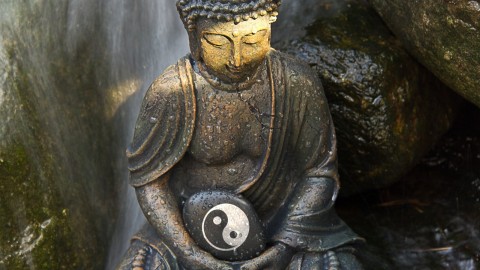One Sufi mystic who had remained happy his whole life — no one had ever seen him unhappy — who was always laughing, who was laughter, whose whole being was a perfume of celebration…. In his old age, when he was dying, on his deathbed and still enjoying death, laughing hilariously, a disciple asked, “You puzzle us. Now you are dying, why are you laughing? What is there funny about it? We are feeling so sad. We wanted to ask you many times in your life why you are never sad. But now, confronting death at least, one should be sad. You are still laughing — how are you managing it?”
The old man said, “It is simple. I had asked my master — I had gone to my master as a young man; I was only seventeen and already miserable, and my master was old, seventy, and he was sitting under a tree, laughing for no reason at all. There was nobody else there, nothing had happened, nobody had cracked a joke or anything, and he was simply laughing, holding his belly. I asked him, ‘What is the matter with you? Are you mad or something?’
“He said, ‘One day I was also as sad as you are. Then it dawned on me that it is my choice, it is my life.’
“Since that day, every morning when I get up, the first thing I decide is… before I open my eyes I say to myself, ‘Abdullah’” — that was his name — “‘what do you want? Misery? Blissfulness? What you are going to choose today?’ And it happens that I always choose blissfulness.”
It is a choice. Try it. When you become aware the first moment in the morning that sleep has left, ask yourself, “Abdullah, another day! What is your idea? Do you choose misery or blissfulness?”
And who would choose misery? And WHY? It is so unnatural — unless one feels blissful in misery, but then too you are choosing bliss, not misery.
Happiness Is A Choice
Many people who choose to seek the spiritual path do so because they are unhappy, unfulfilled, or desperately miserable. They have lived a life that lacks meaning, feels empty, is filled with anger or anguish, or is emotionally excruciating. Whether mild or severe, pain itself is a great motivator when it comes to choosing to grow psychologically.
When there is a gap between that desire and the reality of our life, we may feel keenly interested in finding out what will bring us happiness.
There are two steps to becoming more happy.
First, we must understand why we are unhappy. In a nutshell, we are unhappy because we are trapped in the small, limited confines of our ego personality – identified with a false self that is not who we really are. The ego is endlessly preoccupied with past and future, which are also false realities in the sense that neither are ever happening NOW. The less we are experiencing ourselves and life in the present moment, which is where reality exists, the more unreal and false our life is and the less happy we will be. Understanding this will begin to help liberate us from ego and its trappings and live increasingly in the aliveness of present moment.
The second approach to becoming more happy is contained in a little secret that is very simple and very potent—accept what is.
1. Accept the present moment as it is.
2. The present moment is my friend, not my enemy.
3. I am in alignment with what is, as it is, in this moment.
“Whatever is happening in this moment is OK, neither good nor bad. It just is.”
The secret to happiness is letting go of judgment and resistance to the way things are. When we accept and align with what is, we are not resigning ourselves to a fate we may or may not like. We are empowering ourselves with peace, tranquility and a sense of clarity that will allow us to make wise, non-reactive choices about our conditions.
When we befriend the present moment with acceptance and non-resistance, we will feel more peaceful and be less torn by what we like and don’t like. To be more happy, make friends with what is.
Learning from the story What Do You Want?: Happiness Is A Choice
Experience Learning
Happiness Is A Choice.
But how? Million dollar question?
Learn to be happy: Become Still and Present
Learning to be happy is about managing our negative thought patterns by becoming present. Many of us have an ongoing disturbing mind-chatter that doesn’t serve us. Instead, these unconscious thought patterns take a lot of our energy; we become tired and feel sadness, frustration, anger and other negative emotions. Sometimes we don’t know why we feel bad, because most of the time we are not even aware of this negative mind-chatter, and without the awareness, we can’t stop it.
To know that there is a way of taking “control” of our thoughts rather than the other way around. By becoming present, we stop our disturbing mind-chatter and a space arises. From this space, this thoughtless awareness, a sense of peace is found, and here lies the key to happiness. In order to feel happiness, we must become aware of our feelings and accept them as they are, without any judgments or thoughts. It’s not until we accept things as they are, that the process of resolving and healing begins. When we are present, our mind-chatter automatically stops and everything feels peaceful.
Practice presence by observing your surroundings and start noticing every single detail; how the air feels, notice the different colors in the nature etc. Instead of doing things automatically, pay attention to the details of your work and focus on what you are doing and how this feels. Meditation is a wonderful exercise to become still and “in the now”, in order to resolve negative emotions. When you become still, peace and happiness arise. Next time you experience a negative emotion, focus on your body, feel the energy inside you, be aware of the feelings that you experience and accept them as they are without any judgments and thoughts. When a thought arises (as it will), let it pass and drift away, and then turn your attention back to your body and how it feels. As soon as your mind stops thinking, you become still and aware of the silence, you become present. When you become present a sense of peace within you will arise.
Focuses on thoughtless awareness and presence in order to “manage thoughts”, and find happiness. This awareness can also be found through our emotions.











